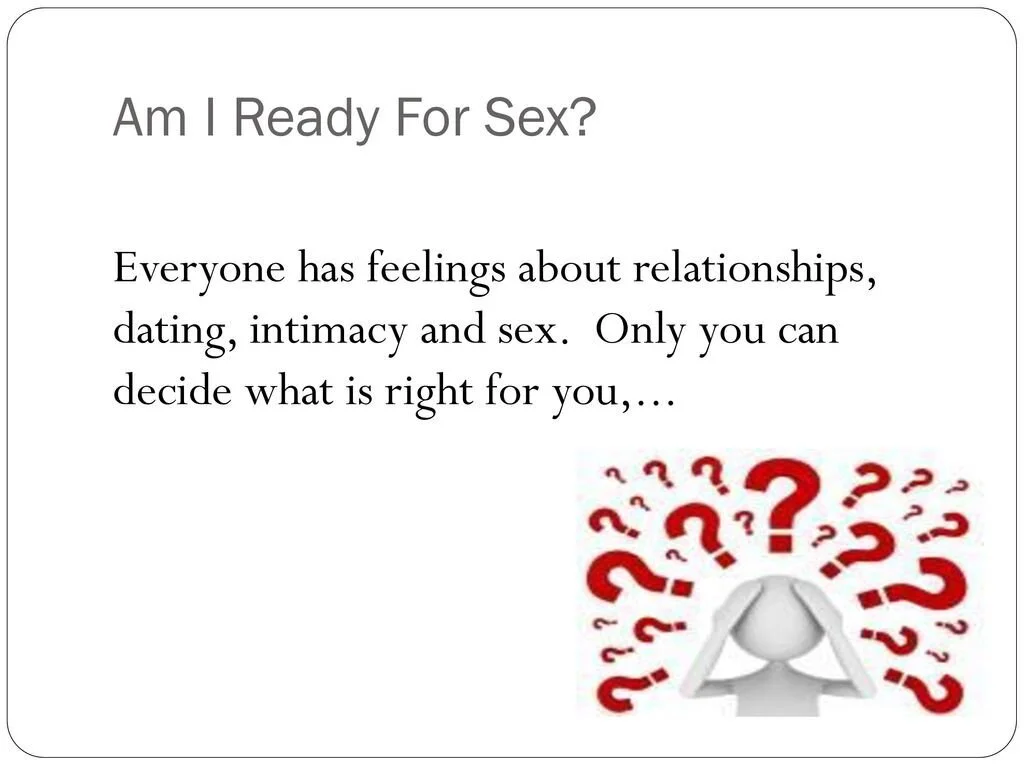Sexual Health
SafeSex808.org is an incredible, comprehensive resource that has more in-depth information on sexual health, sexuality, safe sex, and more. It is a one-stop shop for any sexual-health related concerns, questions, or needs, so be sure to check them out!
Am I Really Ready?
The decision on whether you are ready to have sex is one of the most important decisions you will have to make.
Most importantly, you must use your own judgment (not be pressured), know your personal values and goals, understand the emotional and physical risks that are involved, and decide if it's that right time and with the right person. There are some very important factors that you should consider.
Things to Remember: Deciding When to Have Sex
You're the only one who can, and should, decide.
There are no rules about how long you have to be going out with someone before you have sex.
There is no ‘right age’ to have sex. Some people have their first sexual activity when they’re young and some wait until they’re much older.
Don't decide to have sex just because your friends or partner are pressuring you.
Just because you have had sex before, even with the same person, doesn't mean you have to do it again.
Don't let someone else decide for you by just going along with a situation that could lead to sex. Truly think about if you really want it.
Make the decision to have sex in advance, and stay in control of the situation when it arises. If you change your mind at any point, that is totally fine.
Do not make a decision when intoxicated or drunk, as alcohol will inhibit your judgement and may cause you to do things you may regret later. People are also more likely to have unprotected sex with alcohol in your system, which can lead to an STI or unintended pregnancy.
The law says it's legal for you to agree (or consent) to sex from the age of 16. Learn more about consent at the SafeSex808’s webpage here.
Questions To Ask Yourself Before Having Sex
Does it feel right and do I feel comfortable?
Am I comfortable with my own body?
Do I love my partner? Does he/she love me just as much? Do I feel comfortable with him/her?
Have my partner and I discussed contraceptives to prevent STIs and unplanned pregnancy? Did the talk end in agreement?
Do I know how to use the correct contraceptives to protect myself from unplanned pregnancy and STI transmission?
Do I feel comfortable saying no at any point and feel sure that my partner will stop?
Have I done my research on sex and know what happens, its implications, importance and how to be safe?
Do I know my boundaries and which activities I am not comfortable with?
Do I know my hopes and fears about sex?
Am I physically healthy? Am I sure that I nor my partner doesn’t have any STIs? See below for more info on this.
It’s good to ask yourself all of these questions above and to assess your own readiness and make a decision that feels right to you. If you don’t feel it is right and feel you are not ready, it is perfectly normal to feel hesitations and want to wait. Here are additional questions that might be helpful for you to ask yourself:
Do I feel pressure from anyone such as my partner or my friends?
Am I thinking about having sex just to impress my friends or keep up with them?
Am I thinking about having sex just to keep my partner?
Could I have any regrets afterwards?
If you answer yes to any of these questions, the time isn’t right and you may not be ready.
Am I Really Ready? Resources
Birth Control
The most effective and only 100% way to prevent pregnancy is abstinence.
If you and your partner decide to start having sex, it is very important for you to know your options for birth control. Birth control's primary function is to reduce unwanted pregnancies. It is not 100% effective, but when taken correctly it can greatly reduce the chances. Some birth control methods work better than others, or fit with your lifestyle better. Above all, always remember that in order for birth control to be most effective, it must be used properly and every time.
There are many birth control methods to choose from. Check out the Resource Xtra links below to find out more about each different type of birth control along with clinics and doctor offices that you can visit as well.
Emergency Contraceptive
What happens if you have unprotected sex, forgot to take your birth control method, your partner doesn't pull out in time, or the condom breaks or slips off? What are other options to prevent an unwanted pregnancy?
Emergency Contraception, otherwise known as the morning after pill, is a safe and effective way to prevent pregnancy after unprotected sex. It is birth control that you can use up to five days (120 hours) after unprotected sex. The morning after pills are more effective when taken within 72 hours after unprotected sex, but will still reduce the chances of pregnancy up to 5 days.
Need more info? Learn more about Emergency Contraceptives by clicking on this link! FAQ on Emergency Contraceptive
Birth Control Options
Sorted by most effective & convenient
Source: Planned Parenthood
Birth Control Implant
99% effective
Inserted in upper arm
Releases hormones to prevent pregnancy
$0-1300
Lasts up to 5 years
IUD
99% effective
Inserted in uterus
Affects the way sperm moves, sperm is unable to reach egg
$0-1300
Lasts up to 3-12 years
Birth Control Shot
96% effective
Contains progestin which prevents ovulation and therefore prevents pregnancy
$0-150
Get every 3 months
Vaginal Ring
93% effective
Inserted in vagina
Releases hormones to prevent pregnancy
$0-200
Replace monthly
Birth Control Pill
93% effective
Ingest 1 pill a day
Contains hormones to prevent pregnancy
$0-50
Take daily
Birth Control Patch
93% effective
Releases hormones to prevent pregnancy
$0-150
Replace weekly
Condom
87% effective
Worn on penis
$0-2
Use every time
Internal/Female Condom
79% effective
Worn in vagina
$0-3
Use every time
Diaphragm
83% effective
Inserted in vagina
Covers cervix
$0-75
Use every time
Birth Control Sponge
78 or 86% effective
Inserted in vagina
Covers cervix and contains spermicide
$0-15
Use every time
Cervical Cap
71-86% effective
Inserted in vagina
Covers cervix
$0-90
Use every time
Spermicide & Gel
79 or 86% effective
Inserted in vagina
Blocks entrance to cervix, stops sperm from moving well
$0-270
Use every time
Fertility Awareness
77-98% effective
Track your ovulation
$0-20
Use daily
Withdrawal (Pull Out Method)
78% effective
Pulling out penis from vagina before ejaculation
$0
Use every time
Breastfeeding
98% effective
Your body naturally stops ovulating
$0
Every 4-5 hours
Abstinence
100% effective
Abstaining from sex
$0
Use every time
Tubal Ligation (Sterilization)
99% effective
Surgical procedure
Permanently close fallopian tubes
$0-6000
Lasts for life
Vasectomy
99% effective
Surgical procedure
Blocks or cuts each vas deferens tube
$0-1000
Lasts for life
Birth Control Resources
Sexually Transmitted Infections (STIs)
Sexually transmitted diseases (also known as STDs - or STIs for "sexually transmitted infections") are infectious diseases that spread from person to person through intimate contact. STIs can affect guys and girls of all ages and backgrounds who are having sex - it doesn't matter if they're rich or poor. STIs are more than just an embarrassment. They're a serious health problem. If untreated, some STIs can cause permanent damage, such as infertility (the inability to have a baby) and even death (in the case of HIV/AIDS).
Some of the things that increase a person's chances of getting an STI are:
Sexual activity at a young age. The younger a person starts having sex, the greater his or her chances of becoming infected with an STI.
Lots of sex partners. People who have sexual contact - not just intercourse, but any form of intimate activity - with many different partners are more at risk than those who stay with the same partner.
Unprotected sex. Latex condoms are the only form of birth control that reduce your risk of getting an STI, and must be used every time.
Alcohol and Drug Use. People that are under the influence of drugs are more likely to make impaired judgements and engage in risky behavior.
Before Having Sex: Get Tested for STIs!
Before you decide to have sex, it is so important to ensure that neither you nor your partner have any sexually transmitted infections (STIs). If you or your partner has been sexually active before, it’s best to get tested to make sure no one has any STIs and will pass it on.
To get tested for an STI, first make an appointment at a clinic (such as Planned Parenthood) or with an OB-GYN. See our Doctor’s Appointment page for more information on how to do so.
STIs can be asymptomatic, so you many not even know if you have one at all. That’s why, if you’ve been sexually active, it is so important to frequently get tested, especially before sex with a new partner to ensure you are both physically safe and healthy enough to have sex without transmitting any infections.
Questions to Know Before Getting Tested for an STI:
When did you last have sex?
Did you use a condom the last time you had sex?
Do you have any symptoms, such as discharge, pain, or a rash?
Do you believe you might have an STI?
The Test
Testing for an STI can be conducted in a variety of ways, most commonly:
urine testing
blood testing
genital swabs
Your healthcare provider will talk through which is the best option for you.
After the Test
Waiting for the results can make you nervous or anxious. Don’t worry, those are completely normal feelings! Some test results will come back in a few days, while others may take a week or more. Here are some questions to ask your provider after getting tested:
Is it OK for me to have sex while waiting for results?
What does a positive test result mean and what is the treatment?
What do you recommend I do to protect myself from STIs in the future?
If You’ve Tested Positive:
Your doctor will likely call you in for a follow-up visit to discuss treatment. Ask questions about their recommendations for future actions and what they’re prescribing!
Telling your partner after testing positive can be scary, but it absolutely vital to do, so they can also get tested and treated if you two are sexually active. It is the best thing to do for both their health, yours, and others, so both of you and anyone else you have been sexually active with can protect themselves. Here are some tips to make telling your partner that you have tested positive for an STI a little bit easier:
Gather information about your STI. This is so you can answer the questions your partner might have. Ask your healthcare provider for information about the STI and what they recommend you tell your partner.
Plan ahead. If you’re nervous, write a script and practice it. Start off by pointing out the good things about the relationship before transitioning to the subject about your STI.
Be aware of your attitude and mood when telling your partner. The way you talk about your STI can influence their reaction to it. Be straightforward, calm, and sincere.
Be ready to share information about treatment and symptoms.
Listen. Once the message is delivered, allow your partner to speak and process the information.
Remember that your diagnosis does not define you. Anyone who has sex can get an STI, and just because you have an STI doesn’t mean you’re more promiscuous or dirty. It simply means you got sick, you’re getting treatment, and you want your partner to do the same.
Source: SafeSex808 https://safesex808.org/getting-tested/





































